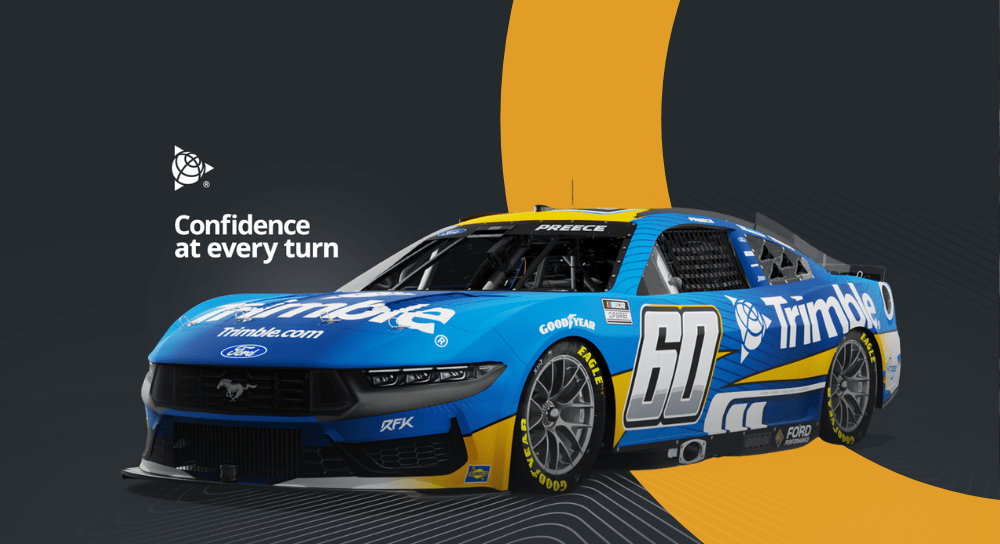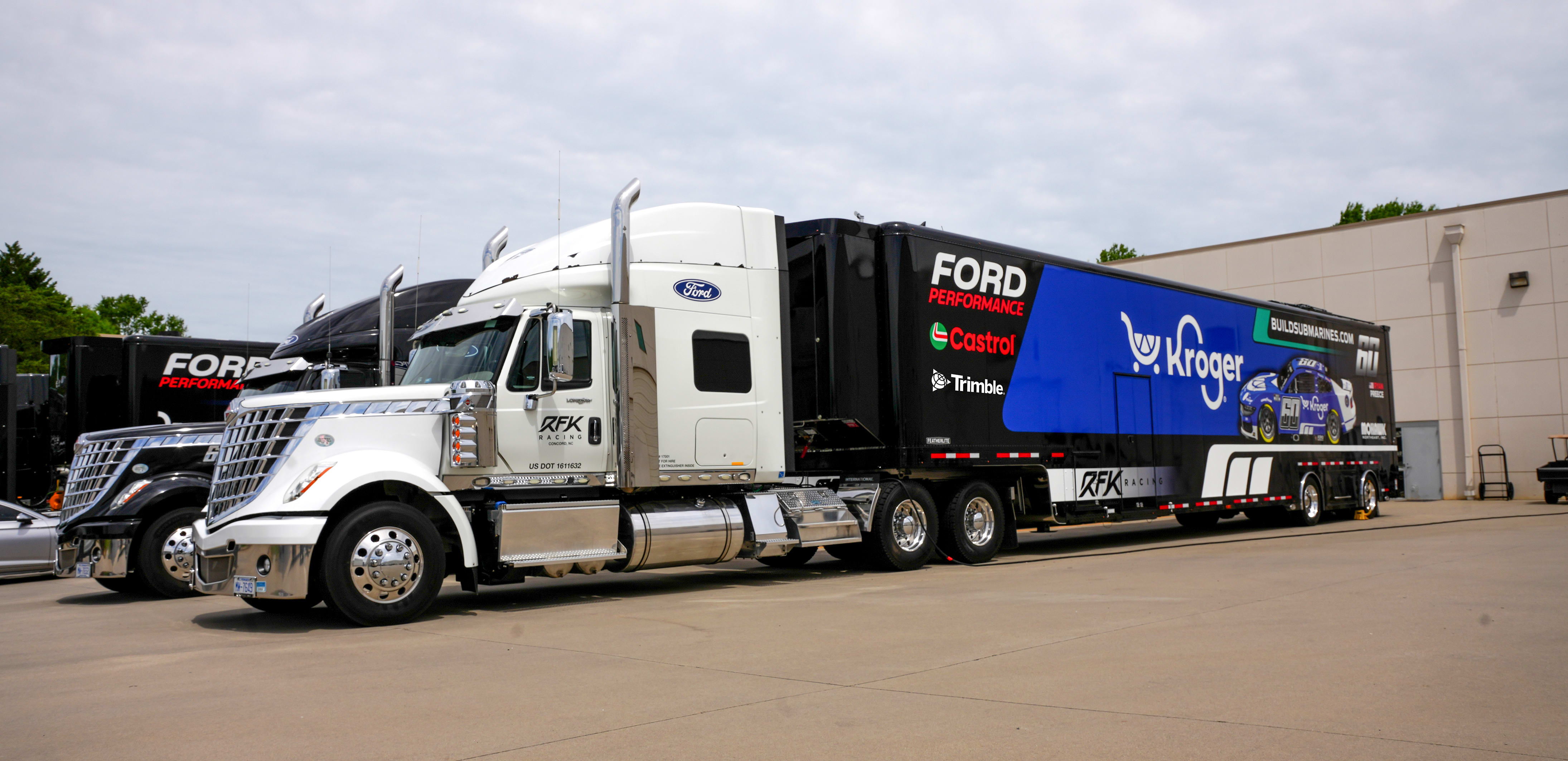On the road to Victory Lane: An interview with RFK Racing’s hauler team | Trimble

Trimble recently announced a new sponsorship of the RFK Racing team. The transportation and logistics industry has a special connection to the world of auto racing. So, we recently spoke with Scott Woodfin, professional race car hauler truck driver for RFK Racing, and his manager, Dave Cote, Director of Transportation and Facilities for RFK Racing, about their experience transporting the RFK Racing cars across the United States throughout their race circuits. Check out our conversation below.
Learn more about Trimble’s partnership with the RFK Racing team here.
Trimble: It’s a pleasure to meet you, Scott and Dave. Can you tell us a little bit about yourselves and your history with auto racing?
Scott Woodfin: I went to my first NASCAR race in 1973 with my father. I was six years old at Richmond Fairgrounds Raceway and ever since, I loved NASCAR and always wanted to do this. I never saw a path into it, but of course, when I thought it’d never happen, that’s when I ended up in it. (laughter) It’s funny how things work out.
So, this is my 12th season as a hauler driver and in that time I've done Trans Am series, IndyCar, IMSA, Global Rally Cross, Xfinity and Cup Series. I worked for an LTL freight company for 20 years before I got into hauling race cars, and ever since, I’ve run the gamut. But this is only my second year with RFK Racing and I got here because a crew chief I worked with previously had a need and asked me to come over here and fill it. So that's why I'm here.
Dave Cote: I've been with RFK Racing for 33 years. I started up with Jack Roush's operation in Michigan doing road racing stuff with a Trans Am IMSA GTO. And then we started our NASCAR Truck operation up there. And then when Jack decided to consolidate all his NASCAR groups into one area in North Carolina, he offered me a position and that's worked out pretty well. So, I've been here since 2003.

Trimble: Tell us about your role on the team and what it entails. What does a typical day or week look like for you?
Scott: Sure. Race car haulers are tractor-trailers designed to carry two cars and everything the team might need to race and that vehicle is my responsibility. They’re more top-heavy than most because the cars ride in the topmost section, while the equipment rides in the bottom, which is much lighter by comparison. The trailer itself is very low to the ground, so you’re catching more crosswinds and you can get blown around pretty good. You have to watch the sharp curves closely.
My day-to-day? How much time you got? (laughter) At the start of a week, we’ll usually be coming back from a racetrack on Sunday or Monday. We’ll take a day off, then come in and start resetting everything for the next weekend’s event. We’ll clean the truck, then restock it with groceries, supplies and parts. Then, we’ll check with the car chief on Wednesday night and if everything’s ready, we’ll head out the next day to wherever the racetrack is. On average, the trip to a track could be between 10 to 15 hours, but there’s two of us responsible for driving the truck and we alternate 10.5 hour shifts. This is especially important for trips that go much longer than that average.
When we get to the track, we’ll work with a guy who travels the circuit to clean the truck again, and make everything shine. Then, we’ll hunt down our rental cars, hotels and some dinner. Next day, usually Friday morning, we’ll unload the trucks: move tires, get fuel, and finally, unload the car. We’ll go through a detailed inspection process, after which there’s a bit of a break unless something needs to be addressed. From there, the team will get some practice time before going straight into qualifying, which will wrap up Saturday. Sunday morning, we’ll come back in and get ready to race.
Dave: A good portion of my week is dedicated to coordinating maintenance, taking care of issues with the trucks. In addition to the racing team, we have a showcar fleet here as well with five trucks, trailers and drivers. A lot of the planning for us happens at the beginning of the year, so we generate our map and routes to all the races then, but shows are often changed or added last minute, so I work with the marketing people to keep the schedule on track.
Trimble: What’s your favorite part of the job?
Scott: Winning and winning. That’s the best part. You can never win enough. There’s no better feeling than being in victory lane. I’ve been lucky enough to be a part of some really cool wins. A recent one with Brad Keselowski at Darlington was his first as an owner of RFK Racing. I was able to celebrate it with Jack Roush and Brad, and my wife happened to be at that race. She was standing outside Victory Lane because I wasn’t sure if she was allowed inside, but the team told me to bring her in and that was really special, the first one we got to celebrate together. Many of the guys on the team have similar stories because we’re all making sacrifices to try to win.
Dave: Like Scott said: we’re all here to win, we’re all competitive. So, that’s the biggest thing. But I also love the team environment and the way everybody works together to get a job done. We share a “do whatever it takes” attitude and it’s a lot of fun to work with a talented, smart group where you learn something new every day.
Trimble: What are some of the biggest challenges you regularly face?
Scott: For the most part, we’ve already navigated to the tracks we visit several times in the past, so the roads are usually familiar to us. But as the race circuit’s expanded, new locations have come into play. For example, this year we had the challenge of traveling, in one week, from Michigan to Mexico City, on roads we never traveled before.
Dave: I think heat is probably our biggest challenge. Tires are an issue we’re dealing with constantly, but dealing with air conditioning units and generators has become more and more important.
Scott: Yeah, weather’s always a challenge. It seems like whenever you schedule a NASCAR race, there’s going to be rain at the track! (laughter) We actually went to Las Vegas one time and it snowed. But the worst that I’ve seen was the recent Hurricane Helene in North Carolina. It was awful. I hope to never see that again.
Trimble: What would you tell someone trying to get into this work? How could someone new to the field prepare themselves to join a team like yours?
Scott: This isn’t easy work. You have to be fit, dedicated, able to work long hours on the road and at the racetrack. And I’d recommend it to anyone, but I’d remind them that God gave you two ears and one mouth and you need to listen more than you talk.
Plus, many drivers who come in have some sort of fabrication skills, like they are welders or have experience working with metal and materials. For instance, I can do carbon fiber work. Nothing major, but we fabricate stuff that keeps the team working on the race car, we can handle that ourselves. You have to know the parts, so when the team asks for something, you can quickly help. In racing, time is everything. I have a co-driver who started this year – sometimes I just quiz him on where stuff is in the trailer so he’s on top of it, too.
Dave: Like Scott said, there are some core questions I’d ask anyone looking to join the team. They need to realize this is challenging work that takes you far from home. It’s really a family endeavor, and everyone needs to understand that you might be gone traveling for long stretches of time. This is a different lifestyle, for sure.
But I actually met my wife through racing! Before I joined here, I was working with a company that regularly purchased vehicle decals from a graphics company. I worked with her often, and before long my boss and her dad were trying to set us up. (laughter) Her family came from an IndyCar background, so she understood the gig immediately. I was traveling all the time for 10 to 12 years, so when I shifted roles and started spending more time at home, it took time to get acclimated to being around on the weekends. But we’ve been married 35 years and she’s been a great support throughout all of it.
Scott: Yeah, I’ll tell you though: our team is a second family. I’ve worked with most of these guys for ten years and we do everything together on the road. We go out to eat, we hang out, we try to find fun things to do when we have downtime. Like I said before, the people we work with are amazing.
Dave: In the end, patience is the biggest thing to me. You rely on your team in NASCAR, and many drivers might have the experience, but they might not have that work ethic to be a part of the team. They need to have patience to learn from others, to learn the business and step up wherever they can. We all win together.
Just like the RFK Racing team, we’re on a journey to provide customers with confidence at every turn, so they can win. Contact our team to learn how our solutions can help your business get to Victory Lane.


